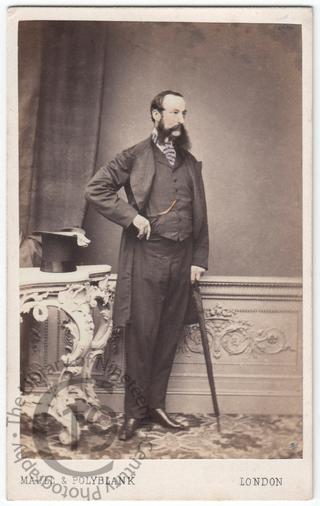
Captain Hans Busk
A carte-de-visite portrait of Captain Hans Busk (1815-1882), who was one of the originators of the ‘Volunteer’ movement.
Born on 11 May 1815, he was the son of the Welsh poet Hans Busk and is often known as ‘Busk the Younger’ to distinguish him from his father. He was educated at King’s College London and at Trinity College, Cambridge. He was called to the bar at the Middle Temple in 1841.
While still an undergraduate, Busk lobbied the Government to form rifle clubs for defence of the realm against foreign invasion. When Lord Melbourne replied that he had several misgivings about 'putting arms into the hands of the people at large,' Busk responded by creating on his own initiative a model rifle club at Cambridge in 1837. This eventually grew into the ‘Volunteers’ movement, which became particularly popular in the late 1850s as a response to the perceived threat of French invasion. Busk served with the 1st Middlesex Rifle Volunteers and with the Victoria Rifles, and wrote a number of practical manuals on the subject of rifle training. According to his obituary, he devoted much of his time to ‘lecturing, writing, and counselling upon the movement’ (London Evening Standard, 14 March 1882).
Busk also took an interest in the design of yachts and lifeboats, and advocated the installation of lifeboat stations, several of which he established at his own cost. He was a gastronome, founding the School of Cookery at South Kensington, and in 1873 he became a Fellow of the Royal Geographical Society.
He died in London - at his residence in Ashlee Place, Victoria Street - on 11 March 1882.
His siblings include the author and social commentator Julia Pitt Byrne and Frances Vansittart, whose divorce from the Reverend Charles Vansittart in 1845 gave rise to the precedent-setting case of Vansittart v. Vansittart.
Photographed by Maull and Polyblank of London.
Code: 126779




